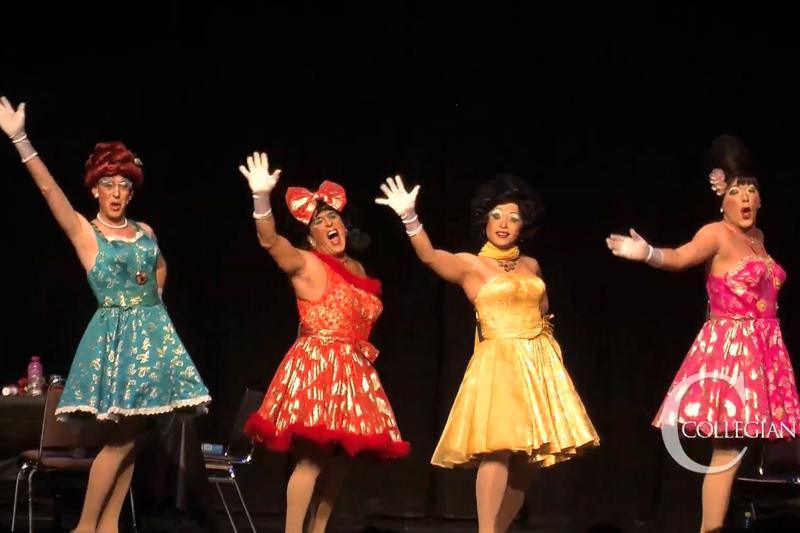
A cappella drag queens The Kinsey Sicks graced the stage of the Satellite Student Union Thursday with their comic and crude songs.
“We think a lot about gender and gender roles,” Irwin Keller, one of the founders of the group, said. “We try to play them in all sorts of different ways and some with ambiguity on are: We drag queens; are we women? Do we not know who are these characters and how do they relate to each other?”
Another founder, Ben Schatz, loves being silly but at the same time, send messages out to his audience members that would make them think.
“I love taking people on a roller-coaster ride,” Schatz said. “They don’t know where we’re going to go. Are we going to be serious? Is that song supposed to be funny? Is it going to get funny?
“Now it doesn’t seem funny. We like taking people on a journey and challenging people and making people think and having some stuff that people might be offended by. We put a lot of thought into it, but it makes it much more meaningful.”
The drag queens are: Rachel, played by Schatz; Winnie, played by Keller; Trampolina, played by Spencer Brown; and Trixie, played by Jeff Manabat.
The Kinsey Sicks were invited to perform at Fresno State by USU Productions and the campus LGBT organization, United Student Pride.
In 1993, the group was formed by accident when the original founders of the group, went in drags to the Bette Midler concert in San Francisco, Schatz said. During the event, someone asked them if they sang, and they said they did not, although all four of them had musical backgrounds.
“On the way home, we started singing and we sounded really good,” Schatz said.
It was that night the group was formed after staying up until 3 a.m. singing a cappella.
Both Brown and Manabat came in at a later time when Trampolina and Trixie’s actors left the group.
Schatz feels that the culture of The Kinsey Sicks reflects its founders a lot.
“We were all professionals. We were all very politically aware and involved and we were all activists in one way or another,” he said. “And we’re all kind of perverse. We’re people who’ve straddled the line between being good and socially inappropriate. So the group was really a reflection of who we were as people, and it’s our calling. Being appalling is our calling.”
The show was part of its 20th Anniversary Tour, titled, “America’s Next Top Bachelor Housewife Celebrity Hoarder Makeover Star Gone Wild!”
Besides performing in theaters, the group also performs in colleges. Schatz said that performing in colleges is entirely different than in a theater and allows members to grow a new fan base.
In a college setting, the group has more leeway in doing whatever it wants to the audiences and “shake them up,” Schatz said.
“I think we’re particularly good for college settings because we are fun and we are filthy,” he said. “We are thought-provoking, and we’re challenging and that’s what colleges are about.”
The best part of all shows, the group agrees is impromptus and improvisations, especially when they are facing technical difficulties. In Thursday’s performance, the audience was able to witness how the group handles Trampolina’s technical difficulties with her microphone.
However, as much as they love it, when Manabat first joined them, he was so confused and frustration with the random things that goes around on stage.
After learning the beauty of improvisations, he eventually became more comfortable with it happening.
“I love the improvisations,” he said. “That’s when magic happens. It’s not going to happen again. It’s not in the script. It just happened here, and it will be gone. But it happened, and you all experienced it and loved it at that moment.”
To create the characters, the founders looked within themselves.
“They were either exaggerations or sometimes they were a bit of the fear of whom we might be if we didn’t control ourselves,” Keller said.
“Over time as an ensemble, the characters changed a little bit because there’s a natural, both tendency and a need, in comedy and theater for the characters to be legs of a table. So there can’t be two characters that are too similar to each other. So I would say it’s a representation by the original members brought to an extreme and re-shifted a bit in order to make a stable foursome.”
The founders were unaware how these characters acted as a form of “therapy.” Keller said they saw the portrayals in each other but not themselves somehow.
“Rachel has changed,” Schatz said. “Rachel is a combination of everything I most want to be and everything I least want to be and fear of.”
Over the years, all members including both old and new, have learned so much from their characters.
“I think our characters allowed us to say things that are hard to say,” Keller said. “Our characters are like masks or puppets. There are things that are easier to say when you have your mask on, and over time, having the practice of saying those things makes it easier to say it with the mask off.”
With the end of its performance at Fresno State, the group hopes that audience members would gain something more than just entertainment.
“Hopefully there’s a message that sticks out from something,” Brown said. “With all of our characters being so different, hopefully, somehow, each one of us relates to someone in the audience. There’s something that clicks with you that goes, ‘I’m just like that in a way. I’ve been like that. I’ve done that. I know what they’re saying.’ Or a song that touches them and it leaves them with that message.”




